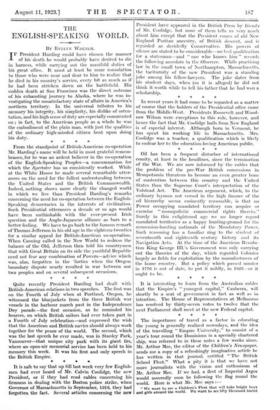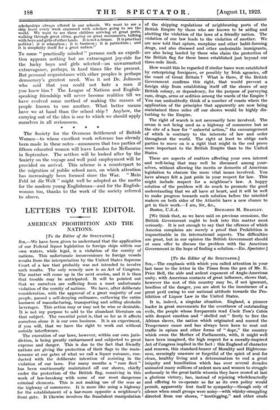THE
ENGLISH-SPEAKING WORLD.
BY EVELYN WRENCH.
IF President Harding could have chosen the manner of his death he would probably have desired to die in harness, while carrying out the manifold duties of his great office. It must at least be some consolation to those who were near and dear to him to realize that he died in his country's service, every bit as much as if he had been stricken down on the battlefield. His sudden death at San Francisco was the direct outcome of his exhausting journey to Alaska, where he was in- vestigating the unsatisfactory state of affairs in America's northern territory. In the universal tributes to his memory his integrity, his simplicity, his dislike of osten- tation, and his high sense of duty are especially commented on ; in fact, to the American people as a whole he was the embodiment of the plain man, with just the qualities of the ordinary high-minded citizen bent upon doing his duty.
From the standpoint of British-American co-operation Mr. Harding's name will be held in most grateful remem- brance, for he was an ardent believer in the co-operation of the English-Speaking Peoples—a consummation for which the Spectator has so consistently worked. While at the White House he made several remarkable utter- ances on the need for the fullest understanding between the United States and the British Commonwealth. Indeed, nothing shows more clearly the changed world in which we live than President Harding's remarks concerning the need for co-operation between the English- Speaking democracies in the interests of civilization. Such Presidential utterances a decade or so ago would have been unthinkable with the ever-present Irish question and the Anglo-Japanese alliance as bars to a better feeling. We have to go back to the famous remark of Thomas Jefferson in his old age in the eighteen-twenties for a similar appeal for British-American co-operation. When Canning called in the New World to redress the balance of the Old, Jefferson then told his countrymen that with Great Britain on its side the youthful Republic need not fear any combination of Powers—advice which was, alas, forgotten in the 'forties when the Oregon boundary dispute nearly resulted in war between our two peoples and on several subsequent occasions.
* * * * Quite recently President Harding had dealt with British-American relations in two speeches. The first was on the Fourth of July when at Portland, Oregon, he witnessed the bluejackets from the three British war vessels in the harbour march past in the Independence Day parade—the first occasion, as he reminded his hearers, on which British sailors had ever taken part in a Fourth of July celebration—and expressed the wish that the American and British navies should always work together for the peace of the world. The second, which was the last speech he ever made, was in Stanley Park, Vancouver—that unique city park with its giant firs, where an open-air memorial service has been held to his memory this week. It was his first and only speech in the British Empire. * * * * It is safe to say that up till last week very few English- men had ever heard of Mr. Calvin Coolidge, the new President, or if they had read cables concerning his firmness in dealing with the Boston police strike, when Governor of Massachusetts in September, 1919, they had forgotten the fact. Several articles concerning the new President have appeared in the British Press by friends of Mr. Coolidge, but none of them tells us very much about him except that the President comes of old New England Puritan ancestry, of British descent, and is regarded as decidedly Conservative. His powers of silence are stated to be considerable—no bad qualification for a statesman—and " one who knows him " records the following anecdote in the Observer. While practising law in the small town of Northampton, Massachusetts, the taciturnity of the new President was a standing joke among his fellow-lawyers. The joke dates from his student days, when (so it is alleged) lie did not think it worth while to tell his father that he had won a scholarship. * * * * In recent years it had come to be regarded as a matter of course that the holders of the Presidential office came from the Middle-West. Presidents Roosevelt and Wood- row Wilson were exceptions to this rule, however, and hence the fact that Mr. Coolidge hails from New England is of especial interest. Although born in Vermont, he has spent his working life in Massachusetts. Mrs. Coolidge was a teacher, a qualification which is likely to endear her to the education-loving American public.
* * * * Oil has been a frequent disturber of international comity, at least in the headlines, since the termination of the War. We are now informed by the cables that the problem of the pre-War British concessions in Mesopotamia threatens to become an even greater bone of contention between this country and the United States than the Supreme Court's interpretation of the Volstead Act. The American argument, which, to the ordinary layman not versed in the high finance of the oil hierarchy seems eminently reasonable, is that no Power occupying mandated territory can acquire or exercise " monopolistic commercial rights therein." Surely in this enlightened age we no longer regard mandated territories as a happy hunting-ground for the concession-hunting nationals of the Mandatory Power. Such reasoning has a familiar ring to the student of seventeenth and eighteenth century history and its Navigation Acts. At the time of the American Revolu- tion King George M.'s Government was only carrying out the theories of the day, which regarded Colonies largely as fields for exploitation by the manufacturers of the home country. But a policy which passed muster in 1776 is out of date, to put it mildly, in 1923—or it ought to be. * * * It is interesting to learn from the Australian cables that the Empire's " youngest capital," Canberra, will shortly be a seat of government in fact as well as in intention. The House of Representatives at Melbourne has resolved by thirty-seven votes to twelve that the next Parliament shall meet at the new Federal capital.
* * * The importance of travel as a factor in educating the young is generally realized nowadays, and the idea of the travelling " Empire University," to consist of a year's tour round the Dominions in a specially chartered ship, was referred to in these notes a few weeks since. Mr. Arthur Mee, the editor of the Children's Newspaper, sends me a copy of a refreshingly imaginative article he has written in that journal, entitled " The British School Fleet." What a pity it is that we have not more journalists with the vision and enthusiasm of Mr. Arthur Mee. If we had, a fleet of Imperial Argos would assuredly soon be following the flag round the world. Here is what Mr. Mee says :- " We want to see a Children's Fleet that will take bright boys and girls around the world. We want to see fifty thousand travel scholarships always offered in our schools. We want to see a ship leave every week crammed with scholars going to see the world. We want to see these children arriving at great ports, walking through great cities, gazing on great monuments, talking with boys and girls of other lands. it is not a dream. It is practical polities ; it is education ; it is business ; it is patriotism ; and it is simplicity itself for a great nation."
To some " practically minded " persons such an expedi- tion appears nothing but an extravagant joy-ride for the lucky boys and girls selected—an unwarranted extravagance, perhaps, in hard times like the present. But personal acquaintance with other peoples is perhaps democracy's greatest need. Was it not Dr. Johnson who said that you could not hate a man if you knew him ? The League of Nations and English- speaking friendship will never become realities till we have evolved some method of making the masses of people known to one another. What better means have we at hand than the school ship ? Anyhow, the carrying out of the idea is one to which we should apply ourselves in all seriousness.
* * * The Society for the Overseas Settlement of British Women—to whose excellent work reference has already been made in these notes—announces that two parties of fifteen educated women will leave London for Melbourne in September. The settlers will be looked after by the Society on the voyage and well paid employment will be provided on arrival. This scheme is a counterpart to the migration of public school men, on which attention has increasingly been focused since the War. " Mein Feld ist die Welt " might well be adopted as the motto for the modern young Englishman—and for the English- woman too, thanks to the work of the society referred to above.



































 Previous page
Previous page